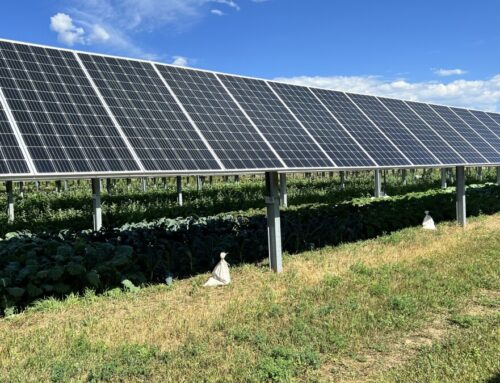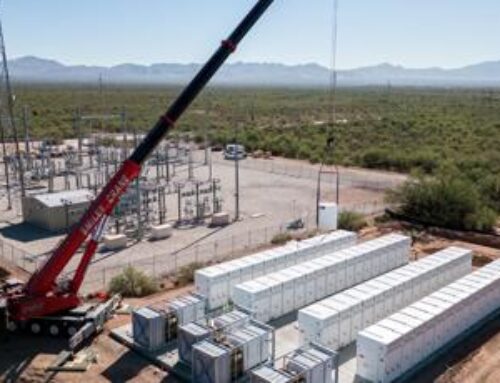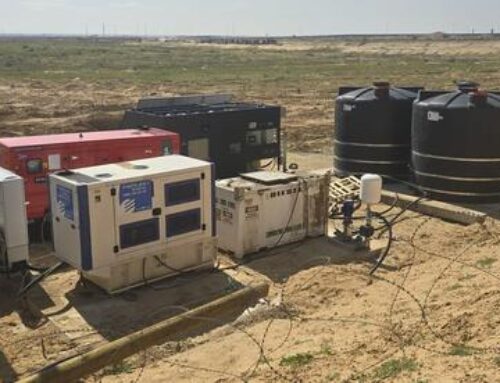Climate change is only a problem for us because our societies have established themselves based on the stable climate we had for hundreds of years and now we have very limited capacity to adapt quickly. Only in a few regions is there really a physical limit — I mean if your island is gone, it’s gone.
Attribution science is answering the question whether and to what extent human-induced climate change — so the burning of coal, oil and gas — has changed the intensity and frequency of extreme weather events. And that is important because our societies are built around a very, very stable climate that has, from a scientific point of view, a very small range of possible weather events. By burning fossil fuels and warming the planet, we change this range. And that means that we now experience, increasingly often, events that would not have been possible or that are more intense than they would’ve been without climate change.
And the price for this change is paid by those who always pay the price. So in heat waves, it is people who are in poor health or who live in poorly insulated homes that die. In a drought, it’s people who are dependent on agriculture for either their food or their basic income that lose their livelihoods. It’s not the wealthy people.
When someone asks, “Was this heat wave or this hurricane caused by climate change,” scientists often say, “Well, we can’t say climate change causes any specific event, but it loads the dice and makes these events more likely.” But in your work you’ve shown that sometimes — not always — you can point to an event and say, “This was caused by climate change.” For example, the 2021 heat wave in the Pacific Northwest of the U.S., which killed more than 800 people. You and your team at World Weather Attribution have said that heat wave would not have been possible without climate change.
Yes, that extreme heat wave would not have happened without human-induced climate change. And for heat waves, we increasingly see events that are so hot that these temperatures would just not have been reached if it wasn’t for the burning of fossil fuels.
This has big implications because it changes the chain of responsibility. Once you can say, “Oh, this event was caused by higher levels of CO2,” then you can begin to say, “Well, where did those higher levels of CO2 come from and who put them there?” And it’s not something simply that we as humanity have done. It’s things that particular actors have done.
So the kind of attribution that I’m doing is establishing one important link in a causal chain. And the causal chain starts with individual companies. They are very familiar names like Chevron, ExxonMobil, Saudi Aramco, Gazprom. These are the companies that dig up the oil, coal, and gas and sell it, and then it gets burned. And that leads to increasing concentrations of greenhouse gas emissions in the atmosphere, which leads to warming of the earth overall. And that leads to the changing intensity and frequency of extreme weather events. So we have known that for a very long time. But the other end of this causal chain is the impact side, which is how those emissions translate into changes in extreme weather events and actually impact society.
Your work, and the work of many other scientists who are working on attribution, is helping to fuel a new wave of lawsuits against fossil fuel companies. Do you think companies like the ones you mentioned should be held accountable for some of these impacts? And what would that accountability look like?
Yes, I do think they should be held accountable, not only because they are profiting massively from an activity where they don’t even acknowledge the damages they know it causes. But because they leave the cost and consequences of dealing with those damages to the people who experience them. I think they should be held accountable for that. And also because we have a lot of evidence that they misled people about it too. These lawsuits are important to just hold these companies accountable. Ultimately, it’s about getting them to change their business model because it will just not be viable anymore to sell a product that destroys our environment. These are not criminal lawsuits. They’re not breaking the law. But they are in a business that kills people and destroys lives and livelihoods.
You wrote: “The main thing I’ve learned from extreme weather events is that the climate crisis is shaped largely by inequity and the still disputed dominance of patriarchal and colonial structures, which also prevents the serious pursuit of climate protection.” Explain?
The inequality between the genders is very much shaping how the impact of climate change is affecting people. And look at what happened with the flooding in Pakistan in 2022, which killed nearly 1,500 people. Part of the reason they had such a dramatic impact is because the whole water infrastructure was built by the Brits, and it was not built by the Brits to provide the Pakistani population with the best available water supply. It was built as a prestigious engineering project to look cool and look impressive, but it was completely dysfunctional and completely ignored the needs of villages.
That’s just one example. You can see it also in other proposed solutions, such as the movement to replace internal combustion engines with the same number of electric vehicles. That means there’s a huge amount of mining now going on in the Global South, exploiting the populations there, using the same colonial structures that have been established during the high times of the empire, and therefore preventing solutions actually thought up by local communities.
Do you think the whole story of the climate crisis would be different if the world were run by women?
I think so, yes. It would be different because at the moment, the story that we tell — I mean, if we admit that there is a crisis at all — is that it’s a physical crisis that has a technical solution. But I think if the story were told from a woman’s perspective, it would probably be told more as a crisis of health, as a crisis of safety, and especially the safety of our children. And of course, that might sound a bit cliche, but I think it is not an accident that people who led the environmental movement in the past, such as Rachel Carson, a scientist whose work led to the phasing out of DDT as pesticides, was a woman. And she in turn inspired other women to campaign against lead in gasoline and paint. And it is because they’re much more affected by it. That doesn’t mean that every single woman would do a better job than a man, of course. But on average, I think we would talk about it very differently.
Your book is a real gut punch to the Trump administration, which is doing everything it can to undermine anything to do with climate justice, from getting out of the Paris Agreement to pulling out of the Green Climate Fund. I know you wrote your book before Trump was elected, but when you look at the U.S. right now, what do you make of what’s happening and the implications of this?
We have seen the first glimpses of the implications of Trump’s policies last year when Hurricane Helene hit Florida and the Southern Appalachians. Florida had a relatively low death toll because that region is very used to hurricanes — they know that when they’re told to evacuate, it’s better to evacuate. But slightly further north in Appalachia, where they’re not quite so used to it, even though the forecasts were really good and people knew that it was dangerous, and people from FEMA tried to help people evacuate, a lot of Trump supporters actually attacked FEMA and obstructed their attempts to help. More people died because of it. So even before his inauguration, Trump’s lies led to a lot of people who voted for him losing their lives and their livelihoods.
Ending funding for USAID is another example. Trump and his people portray everything the U.S. has ever done in terms of aid is charity, but of course it is not, because the U.S. has profited dramatically from the world order that had the Global North prospering and the Global South basically building the stuff and taking the rubbish that we don’t want and getting a bit of aid for that. It is a massive injustice that the U.S. has very much profited from. But dismantling it will lead to more instability globally. It will increase wars, it will mean that trading the business with lots of parts of the world will be much harder for the U.S. and it will just make the U.S. poorer.
There are a lot of right-wing parties in power in Europe that want to piggyback on Trump and dismantle policies for clean air and things like that. But I think there is definitely an alarm going off. A warning that says if this continues, it will just destroy the world as we know it. We actually need those institutions that we build. I mean, we decided on human rights for a reason. And I think that is slightly heartening in a way. A lot of people are realizing it is not just the poor — who a lot of people never really cared about anyway — who will be hurt by the rolling back of environmental protections and the dismantling of institutions. It will hurt everyone.
The central lie in the Trump administration is that our modern world and prosperity is dependent upon burning fossil fuels. And if you try to get off of fossil fuels, then everything that we kind of consider as part of modern life will kind of go away.
It is of course true that the access to cheap energy was important to start this western way of life. But first of all, we now have other sources of cheap energy than fossil fuels. But what’s more important, what’s completely missing in this narrative, is that it is not the access to energy per se that led to the prosperous lifestyle. The American Dream is not about fossil fuels. It is about access to high-quality education for everyone. It is about better access to Social Security, and that you can only be socially mobile if you have a network that allows you to go to school long enough to actually learn something. Or if you are stuck in a job that is not fulfilling, that you can change jobs. Or if you get sick, you have access to decent health care.
We are not exactly living in the golden age of scientific thinking. You can blame Trump for that, but there are other factors, too. In a significant part of the U.S. as well as other countries, science is increasingly seen as just another belief system, a kind of modern voodoo that maybe you happen to believe in, maybe not. As a person who has devoted her life to science, what do you think about that?
Sadly, it’s also not just coming from the outside, from people like Trump. There are also people who used to be scientists who talk about science being broken and not working. What that means for scientists like myself is to just hold very firmly against that. We have the scientific method, which is basically that every bit of science we do is testable. We can run experiments and see if something is true or not. And voodoo is not testable. That’s the key difference. That of course means that science can be wrong and can be overturned, but that’s actually the strength of science. It shows that it is working when we learn something new. And I mean, you cannot say you don’t believe in science and drive a car because without science, you would never have a car. You would never have been able to turn that fossil fuel into kinetic energy. And if you don’t believe in science, well, I hope you never step into an airplane.
Contributing Writer Jeff Goodell’s most recent book is The Heat Will Kill You First: Life and Death on a Scorched Planet.




